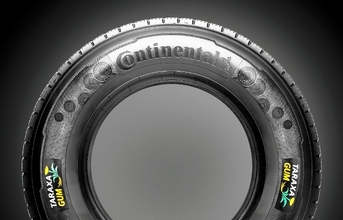
Automotive supplier Continental has reached an important milestone in its research project for the industrialization of dandelion rubber in tire production. During the International Motor Show (IAA) Commercial Vehicles in Hanover, Continental presented the first test tires made from the innovative material that the company is calling Taraxagum, derived from the botanical name for dandelion (taraxacum).
The natural rubber in the treads of the test tires was completely replaced with Taraxagum. This important step takes Continental even closer to reaching its goal of making tire production more sustainable and less dependent from traditional raw materials.
"After several years of development work together with the Fraunhofer Institute, we are excited to take the first dandelion tires to the road. In order to make the best use of the crop yield produced to date, we decided to build passenger car winter tires, as they contain a high portion of natural rubber," explains Nikolai Setzer, Member of the Continental Executive Board and responsible for the Tire Division.
Continental intends to industrialize dandelion rubber and introduce it to serial production within the next five to ten years. The tires will undergo thorough testing at the Contidrom proving grounds near Hanover as well as in Arvidsjaur, Sweden. Setzer stresses: "This is of utmost importance, as we will not make any compromise when it comes to performance."
"The development process of Taraxagum has been very promising so far and we are continuing the industrialization together with our partners. We are very confident that our current research results will be confirmed through the tire tests and that they will meet the performance targets," adds Dr. Andreas Topp, Head of Material and Process Development as well as Industrialization for Tires at Continental.
Through extensive research in cooperation with the Fraunhofer Institute for Molecular Biology and Applied Ecology (IME), the Julius-Kühn-Institute, and the plant breeder Aeskulap GmbH, a very high-yielding and robust kind of Russian dandelion was cultivated.
The project's long-term goal is to find an ecologically, economically as well as socially viable solution for the increasing natural rubber demand. Russian dandelion can be cultivated on previously unused acreages in temperate regions throughout Europe, which are also close to Continental's tire plants.
This shortens transport routes and reduces the environmental impact. In May 2014, the dandelion rubber project was awarded the prestigious environmental and economic prize ‘GreenTec Award' in the Automobilty category.
END



























